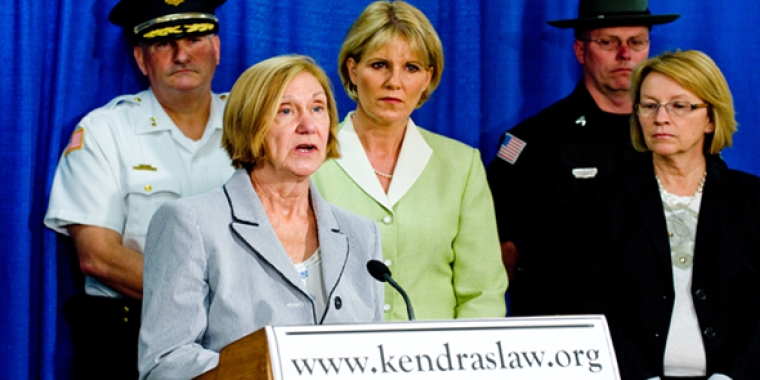
Sen. Young: Coalition Seeks to Make Kendra’s Law Permanent
Catharine Young
June 1, 2010
-
ISSUE:
- Mental Health

Sen. Young Leads Effort for Public Safety and Humane Treatment for Those with Severe Mental Illness
ALBANY, N.Y. – Senator Catharine Young (R,C,I – Olean) joined Pat Webdale of Fredonia to lead a broad coalition of mental health advocates, law enforcement officials and other lawmakers today, calling for permanent reauthorization of Kendra’s Law.
The law was named for Kendra Webdale, a 32-year-old woman who in 1999 was pushed in front of a subway train by a man with untreated schizophrenia who was roaming New York City streets. Kendra’s Law established “Assisted Outpatient Treatment” (AOT) in New York, allowing courts to order severely mentally ill outpatients to comply with treatment, while ordering counties to provide such treatment and monitor compliance. The law expires this month.
“The law named for my daughter has been a fitting tribute to her,” said Patricia Webdale of Fredonia. “It has helped thousands of people with severe mental illness, just as Kendra would have wanted to help the man who pushed her. I urge lawmakers not to simply extend the law again, but to finally make it permanent.”
Senator Young said, “The person who murdered Kendra, Andrew Goldstein, previous had assaulted 13 people. If a law similar to Kendra’s Law had been in place, Goldstein may have received the treatment he desperately needed, and Kendra possibly could have been alive today. It is very compelling.”
“Kendra's Law has been a tremendous success. Studies have uniformly found that it leads to dramatically better outcomes for patients, and reduces the need for costly hospitalization, incarceration, and crisis intervention. There is no good reason for failing to make this law permanent,” Senator Young added.
“I admire Pat and Ralph Webdale deeply for their tireless advocacy. They don’t want other families to suffer as they did and have devoted themselves to helping people with serious mental illness,” said Senator Young.
Assembly Member Aileen Gunther (D-Monticello) said: “Kendra’s Law saves lives by ensuring that individuals with severe mental illness who go off their medications do not create dangerous situations for themselves and others. The law has been proven effective in study after study and should be made permanent.”
In addition to Ms. Webdale and the legislative sponsors, a range of mental health advocates, caregivers and law enforcement officials support making the law permanent, including: the New York State affiliate of the National Alliance on Mental Illness (NAMI-NYS); Hospital Association of the State of New York (HANYS); the Treatment Advocacy Center; the District Attorneys Association of the State of New York (DAASNY); the Public Employees Federation (PEF); and the New York State Association of Chiefs of Police.
Law enforcement officials attending the event include: New Windsor Police Chief Michael Biasotti; Peter Kehoe of the New York State Sherriff’s Association; and Sgt. Mark St. Germaine and Sgt. Anthony Dagostino of the Rensselaer County Sheriff’s Department.
Five-year sunsets were attached to both the original enactment of Kendra’s Law in 1999, and the 2005 reauthorization. In both cases, the legislature cited the need for further study of the law’s effectiveness and impact on the mental health system, and called for state-financed reports to shed light on specific concerns.
James Pavle, Executive Director of the Treatment Advocacy Center, expressed hope that this time, lawmakers would grant Kendra’s Law more than another few years’ reprieve: “Frankly, keeping Kendra’s Law in perpetual limbo is a cop out. If the mountain of data we have now isn’t enough to establish the program’s worth, what would ever be? Instead of constantly defending our hard-won gains, we should be devoting our full energies to improving mental health care in New York.”
Three major studies have found that the AOT program created under Kendra’s Law has improved quality of life for the severely mentally ill, enhanced public safety, and reduced the need for costly services.
A 2005 New York State Office of Mental Health study found that AOT recipients experienced a 74 percent decline in homelessness; a 77 percent decline in hospitalization for mental illness; an 83 percent decline in arrests; and an 87 percent decline in incarceration.
A 2009 independent study led by researchers at Duke University School of Medicine affirmed that the use of court orders is a vital component of the program’s success. After comparing court-ordered AOT patients with a similar group receiving equivalent services voluntarily, the researchers concluded: “The increased services available under AOT clearly improve recipient outcomes. However, the AOT court order itself, and its monitoring do appear to offer additional benefits in improving outcomes.”
In February 2010, researchers at Columbia University’s Mailman School of Public Health released their study of Kendra’s Law’s impact on public safety in New York City. The study compared AOT recipients with histories of violence to a control group receiving voluntary treatment in the same clinics. The individuals receiving AOT — who were more violent to begin with — were four times less likely than members of the control group to perpetrate serious violence after undergoing treatment.
For more information visit: www.kendraslaw.org
Share this Article or Press Release
Newsroom
Go to NewsroomRevitalization Funding Coming For the City of Salamanca
January 26, 2017
Redevelopment Efforts For The Burrous Building Gain State Support
January 26, 2017